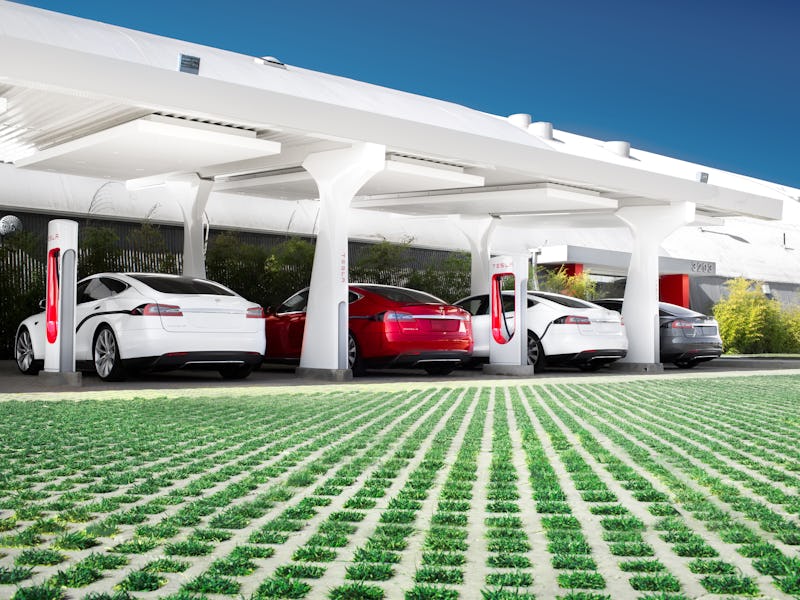Tesla CEO Elon Musk criticizes fuel cell idea: ‘staggeringly dumb’
In a series of Twitter posts, the CEO also equated fuel cells to "fool sells."

Elon Musk has criticizised a competitor's idea to go with fuel cells instead of batteries for its zero-emissions vehicles, declaring the proposal "staggeringly dumb." Musk also dismissed the concept of using fuel cells in general, equating them to "fool sells."
The Tesla CEO made the comments via his Twitter account Thursday, responding to an article shared about South Korean automaker Hyundai. The Bloomberg story, published Tuesday, is an interview with Saehoon Kim, head of the firm's fuel cell division.
The technology could enable cars to deliver longer driving range and faster refueling times than battery-powered vehicles, taking in hydrogen and emitting water. Although they account for around 0.1 percent of all vehicles produced globally each year, Kim has been working on Hyundai's fuel cell strategy since 2003 as an alternative to the emergent electric car race. It launched the Nexo, a purpose-built hydrogen vehicle, in 2018.
But on the subject of the hydrogen supply, Kim's comments suggested a flaw in Hyundai's plan:
"Right now, hydrogen is made as a by-product of fertilizer and oil refining. South Korea isn’t ideal for wind and solar energy. Korea will produce what it can from the renewable energy capacity it has but it won’t be enough. The rest will be imported from areas that have lots of renewable energy. South Korea and Japan are considering bringing hydrogen from Australia."
"Staggeringly dumb," Musk wrote in response to the quotation.
It's not the first time Musk has dismissed the technology. In 2014 he described fuel cells as “mind-bogglingly stupid,” “incredibly dumb,” and “fool cells.” During a 2015 press conference, he explained that the main issue is where to find the hydrogen – creating it from water, for example, requires electrolysis to split the two hydrogen atoms from the one oxygen atom. He claimed that using a solar panel to split the molecule, then using the hydrogen to power a car, is about half as efficient as just using the panel to charge a car battery.
This analysis was backed up by a CleanTechnica report this week, which showed battery-powered electric vehicles can expect an overall efficiency of 73 percent from the power source to the wheel. Hydrogen, on the other hand, only reaches 22 percent. Traditional vehicles offer a 13 percent efficiency.
"Exactly, fuel cells = fool sells," Musk wrote in response.
That hasn't stopped firms from trying their hand at hydrogen vehicles. British firm Riversimple announced the Rasa in May 2018, which offers a single monthly fee to cover the vehicle instead of a traditional car ownership model.
In March 2020, Toyota also announced plans to work with subsidiary Hino Motors on a hydrogen fuel cell truck. The plans cut to the heart of one of Tesla's most ambitious projects, the battery-powered Semi truck announced in November 2017. Tesla has proposed a series of ultra-powerful chargers to bring its truck back up to full capacity in a reasonable amount of time, an issue hydrogen doesn't need to worry about so much.
While the plans seem interesting, it seems investors are more taken by Musk's vision – Tesla surpassed Toyota this week to become the world's most valuable automaker.
The Inverse analysis – It's perhaps little surprise that Musk isn't too keen on fuel cells. Tesla has invested heavily in battery-powered electric vehicles being the future of transportation, and Musk has a vested interest in selling Tesla's vision to investors.
It's also hard to deny, though, that electric vehicles are gaining traction while hydrogen is barely a blip in the broader market. IHS Market cites data claiming the hydrogen-powered global fleet could expand to 400,000 by 2025. While battery-powered vehicles are making waves in the consumer market, the report notes that hydrogen's benefits could make it useful for buses and semi trucks – but a hydrogen-led future seems unlikely based on current trends.